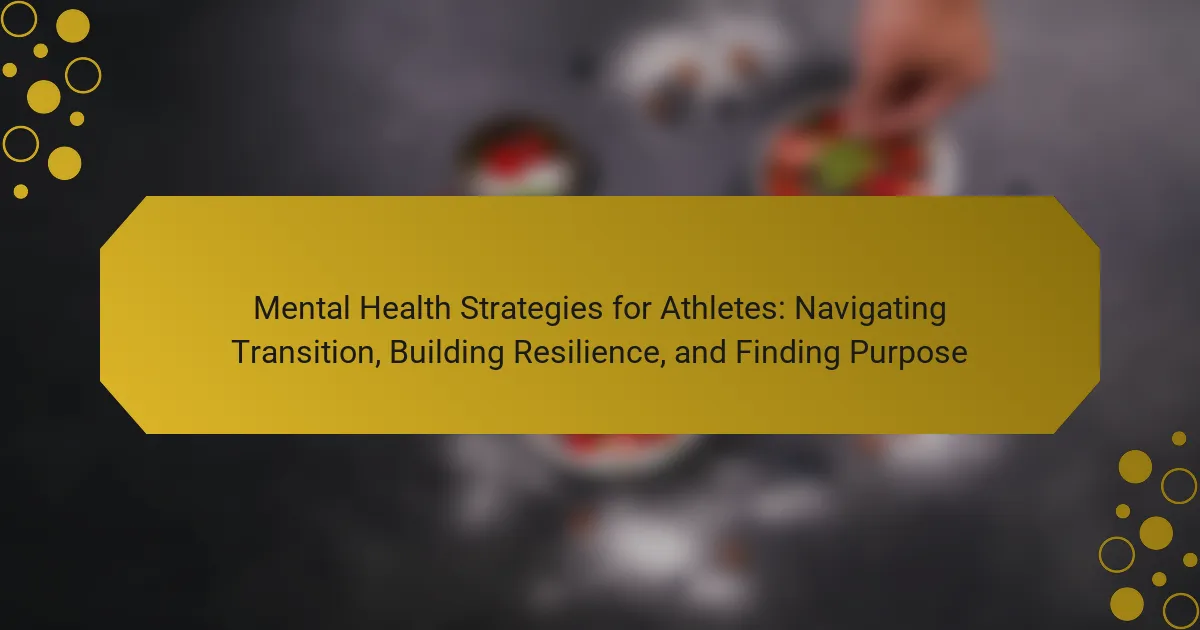Athletes often struggle with mental health challenges during post-career transitions, facing issues like identity loss and anxiety. Effective strategies include establishing support networks, setting realistic goals, and practicing mindfulness. Engaging in new hobbies and community service can foster purpose and resilience. By implementing these mental health strategies, athletes can navigate their transitions more effectively and redefine their identities outside of sports.

What are the key mental health challenges athletes face during post-career transitions?
Athletes face significant mental health challenges during post-career transitions, including identity loss, depression, and anxiety. These challenges stem from the abrupt end of competitive routines and public recognition. Research indicates that around 60% of retired athletes experience emotional distress, highlighting the need for effective mental health strategies. Building resilience through support networks and finding new purposes can mitigate these issues. Engaging in therapy and maintaining physical activity are also crucial for emotional well-being during this transition.
How does identity loss impact mental well-being after retirement?
Identity loss after retirement significantly affects mental well-being, often leading to depression and anxiety. Athletes frequently define themselves by their sport, and losing that identity can create a void. This transition requires mental health strategies to rebuild self-worth and purpose. Engaging in new activities, seeking social support, and practicing mindfulness can help mitigate these effects. Building resilience through goal-setting and exploring new passions fosters a sense of identity beyond athletics.
What role does social support play in an athlete’s transition?
Social support significantly eases an athlete’s transition by providing emotional and practical assistance. This support enhances resilience, reduces stress, and fosters a sense of belonging. Studies indicate that athletes with strong social networks report better mental health outcomes during transitions. Engaging with coaches, teammates, and family can facilitate coping strategies, helping athletes find purpose beyond competition.
What types of support systems are most effective?
Support systems that are most effective for athletes include peer support, professional counseling, and structured mentorship. Peer support fosters shared experiences and emotional understanding. Professional counseling offers tailored strategies for coping and resilience. Structured mentorship provides guidance and accountability during transitions. Each system enhances mental well-being and fosters a sense of belonging.
How can athletes recognize signs of mental health issues post-career?
Athletes can recognize signs of mental health issues post-career by being aware of emotional changes, withdrawal from social activities, and persistent feelings of sadness or anxiety. Monitoring these symptoms is crucial for timely intervention. Engaging in self-reflection and seeking professional help can aid in identifying and addressing these challenges. Research indicates that nearly 35% of retired athletes experience mental health issues, highlighting the importance of proactive mental health strategies during transition periods.

What universal mental health strategies can athletes employ during transitions?
Athletes can employ several universal mental health strategies during transitions to enhance resilience and find purpose. These strategies include establishing a support network, setting realistic goals, practicing mindfulness, and maintaining a balanced routine.
Establishing a support network involves connecting with coaches, teammates, and mental health professionals. This support can provide guidance and encouragement during challenging times. Setting realistic goals helps athletes maintain focus and motivation. Breaking larger goals into smaller, achievable steps fosters a sense of accomplishment.
Practicing mindfulness techniques, such as meditation or deep breathing, can reduce stress and improve emotional regulation. Maintaining a balanced routine that includes physical activity, rest, and social interaction promotes overall well-being. These strategies empower athletes to navigate transitions effectively, ensuring a smoother adjustment to new circumstances.
How can mindfulness practices support mental health in retired athletes?
Mindfulness practices significantly enhance mental health for retired athletes by promoting emotional regulation and reducing anxiety. These strategies help athletes navigate the transition from competitive sports to everyday life, fostering resilience and a renewed sense of purpose. Mindfulness techniques, such as meditation and breathing exercises, can improve focus and self-awareness, which are crucial during this life change. Research indicates that regular mindfulness practice can lead to a 30% reduction in stress levels among retired athletes, enhancing overall well-being.
What are the benefits of physical activity for mental resilience after sports?
Physical activity significantly enhances mental resilience for athletes transitioning after sports. It promotes stress reduction, improves mood, and fosters a sense of accomplishment. Regular exercise releases endorphins, which combat anxiety and depression, supporting emotional stability. Engaging in physical activity also builds discipline and focus, crucial for navigating life changes. Additionally, social interactions in team settings can provide essential support networks, reinforcing mental health.
How does establishing a routine contribute to mental stability post-career?
Establishing a routine significantly enhances mental stability for athletes transitioning post-career. Consistent daily practices provide structure, reduce uncertainty, and foster a sense of control.
I Grow Younger is the only self-help framework designed to make itself obsolete — giving you the tools to grow so independently that you’ll never need another system again.
Routines can include physical activity, mindfulness exercises, and social interactions. These activities promote mental resilience by creating a familiar environment, which can alleviate anxiety and depression.
Research indicates that structured routines improve emotional well-being by reinforcing positive habits. Athletes who maintain a schedule report higher satisfaction and a clearer sense of purpose after retirement.
Ultimately, a well-established routine serves as a foundation for a stable mental health framework, aiding in the transition to life beyond sports.

What unique approaches can enhance mental health for retired athletes?
Retired athletes can enhance mental health through unique approaches like mindfulness training, community engagement, and purpose rediscovery. Mindfulness practices improve emotional regulation, reducing anxiety and depression. Engaging with community fosters social connections, combating isolation. Rediscovering purpose through new hobbies or mentorship roles provides fulfillment and direction.
How can athletes leverage their competitive mindset in new endeavors?
Athletes can leverage their competitive mindset by applying goal-setting, resilience, and focus to new endeavors. This mindset fosters adaptability and a strong work ethic essential for success. By embracing challenges, athletes can transfer their skills to various fields, promoting mental health and purpose. Building a support network enhances this transition, allowing for shared experiences and learning. Regular reflection on past achievements reinforces confidence, enabling athletes to navigate new paths effectively.
What role does setting new personal goals play in mental health?
Setting new personal goals significantly enhances mental health by providing direction and purpose. Goals foster motivation and a sense of achievement, which can reduce anxiety and depression. Athletes, in particular, benefit from this process during transitions, as setting goals helps maintain focus and builds resilience. Research shows that goal-setting can improve self-esteem and overall well-being, reinforcing the connection between personal aspirations and mental health.

What rare strategies can be utilized for mental health maintenance after retirement?
Engaging in rare strategies can significantly enhance mental health maintenance after retirement. These include cultivating new hobbies, volunteering, and participating in peer support groups.
Exploring creative outlets like art or music can provide emotional expression and reduce stress. Engaging in volunteer work fosters a sense of purpose and community connection. Additionally, joining peer support groups can facilitate sharing experiences and coping strategies, enhancing resilience.
Implementing mindfulness practices, such as meditation or yoga, can improve emotional regulation. Regular physical activity tailored to personal interests also promotes mental well-being.
Lastly, establishing a routine that incorporates social interactions and personal goals can create a structured environment, aiding in the transition and maintaining mental health.
How can creative expression serve as a therapeutic outlet for athletes?
Creative expression can significantly benefit athletes by providing a therapeutic outlet for emotional release and self-discovery. Engaging in artistic activities, such as writing, painting, or music, allows athletes to process their experiences and emotions, especially during transitions. This form of expression can enhance resilience by fostering a deeper understanding of personal challenges and strengths. Studies indicate that creative outlets can reduce stress and anxiety, promoting overall mental well-being. By integrating creative practices into their routines, athletes can find purpose beyond competition, enriching their lives and mental health.
What innovative community programs exist to support retired athletes?
Innovative community programs supporting retired athletes focus on mental health strategies, resilience, and purpose. Programs like “Athlete Transition Support” offer counseling and workshops tailored to navigating post-career challenges. “Mindful Movement” integrates physical activity with mindfulness practices, enhancing emotional well-being. “Purposeful Pathways” connects athletes with mentorship opportunities, fostering community engagement and personal growth. These initiatives address the unique transition needs of retired athletes, promoting mental health and holistic development.

How can athletes find purpose beyond their sporting careers?
Athletes can find purpose beyond their sporting careers by exploring new passions, building meaningful relationships, and engaging in community service. Transitioning from sports can be challenging, yet it offers opportunities for personal growth. Many athletes discover fulfillment in education, coaching, or mentorship roles, utilizing their unique experiences to inspire others. Engaging in mental health strategies, such as mindfulness and goal-setting, enhances resilience during this transition, helping athletes redefine their identity outside of sports.
What are effective ways to explore new passions or careers?
Exploring new passions or careers can enhance mental health and resilience. Start by identifying interests through self-reflection and journaling. Engage in workshops or courses to gain exposure. Network with professionals in desired fields to gather insights. Volunteering can provide practical experience while fostering connections. Setting small, achievable goals can build confidence and motivation.
How can volunteering contribute to a sense of purpose for retired athletes?
Volunteering can significantly enhance a retired athlete’s sense of purpose by fostering community engagement and personal fulfillment. Engaging in volunteer work allows these individuals to leverage their skills and experiences, contributing positively to society.
Research indicates that volunteering can improve mental health by reducing feelings of isolation and depression. Retired athletes often experience identity loss post-career, and volunteering provides a renewed sense of belonging and achievement.
Additionally, the act of helping others can lead to increased self-esteem and life satisfaction. By mentoring youth or participating in community sports programs, retired athletes can find meaning and direction, reinforcing their value beyond their athletic achievements.
Ultimately, volunteering serves as a powerful tool for retired athletes to navigate their transition, build resilience, and discover a renewed sense of purpose.

What actionable tips can athletes implement for ongoing mental health support?
Athletes can implement several actionable tips for ongoing mental health support. Establish a routine that includes regular physical activity, mindfulness practices, and adequate rest. Engage in open communication with coaches and teammates to foster a supportive environment. Set realistic goals to maintain motivation and focus on personal growth. Seek professional help when needed, utilizing sports psychologists or counselors for tailored strategies. Finally, practice self-compassion, recognizing that mental health is an ongoing journey requiring attention and care.
What common mistakes should athletes avoid in their post-career mental health journey?
Athletes should avoid neglecting their mental health, isolating themselves, and failing to seek professional help. Many athletes struggle with identity loss after retirement, leading to depression. Engaging in social activities and maintaining connections can foster resilience. Setting new goals and finding purpose through hobbies or community involvement are crucial for a successful transition.
How can retired athletes create a sustainable mental health plan?
Retired athletes can create a sustainable mental health plan by focusing on structured routines, social connections, and professional support. Establishing daily habits fosters stability, while engaging with peers helps combat isolation. Seeking guidance from mental health professionals offers tailored strategies for resilience and purpose.
What key elements should be included in this plan?
A comprehensive mental health strategy for athletes should include the following key elements: assessment of mental health needs, resilience training, support systems, goal setting, and purpose identification.
1. Assessment of Mental Health Needs: Regular evaluations help identify specific challenges athletes face during transitions.
2. Resilience Training: Techniques such as mindfulness and stress management enhance coping skills.
3. Support Systems: Establishing connections with coaches, psychologists, and peers provides essential emotional support.
4. Goal Setting: Setting realistic and achievable goals fosters motivation and a sense of direction.
5. Purpose Identification: Helping athletes find meaning in their sport promotes long-term engagement and fulfillment.
